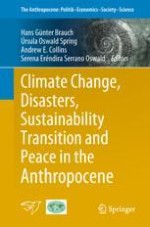Abstract
This essay contributes to a conceptual discussion on the need for bridge-building between the natural and social sciences, among different social science disciplines, and the research programmes in political science focusing on peace, security, development and environment (‘sustainable development’), by introducing the two new linkage concepts of ‘political geo-ecology’ and ‘peace ecology’. It focuses on the policy goal of a ‘sustainable peace’ understood as ‘peace with nature’ in the newly proposed epoch of earth history, the Anthropocene.
The key argument of this chapter is that this goal may be achieved by a process of ‘sustainability transition’ that addresses the economic causes of greenhouse gas concentration in the atmosphere, in which where concerned individuals, families, local communities, states and nations as well as international governmental organisations and non-governmental bodies and social movements may contribute to the transition.
This text suggests that the goal of a ‘sustainable peace’ may be addressed from a peace ecology perspective that integrates both peace and security studies and ecology or ecological approaches aiming at the realisation of the goal of a ‘sustainable development’. It is argued that this requires a shift from disciplinary and multidisciplinary research methods towards inter- and transdisciplinary approaches by moving towards a ‘transformative science’ aiming at a ‘sustainable peace’ where the needed policy changes and the actors and processes of this change towards sustainability should become a part of the research design and action research process.
This essay touches on the manifold fundamental conceptual, methodological, theoretical and action-oriented research needs of a ‘peace ecology approach’ that aims at contributing to the realisation of a ‘sustainable peace’ as ‘peace with nature’ in the ‘Anthropocene’, where the societal outcomes of the physical effects of global environmental and climate change can be countered and mitigated by policies of adaptation, mitigation and an increase of resilience by the affected people.
From the perspective of a Hobbesian policy approach of ‘business-as-usual,’ but also from traditional scientific worldviews, this goal may appear at present to be utopian and for sceptics, it is not achievable. It requires a fundamental change in the dominant ‘worldview’ of many scientists and of the neoliberal mindset of most policymakers, practitioners, but also of ordinary citizens towards an alternative sustainability approach.
For the natural and social sciences it requires a new ‘scientific revolution towards sustainability’ – similar to what Kuhn (
1962) called the ‘Copernican Revolution’ or Schellnhuber (
1999) outlined as a ‘Second Copernican Revolution’ – with a new scientific paradigm of a ‘peace ecology’ that still needs to be developed in the future.
This holistic approach of linking different scientific discourses with discussions in the political realm deliberately distances itself from the mainstream of political science contributions with often narrowly focused theoretical discussions that solely appeal to a scientific audience and are hardly noted in societal and political discussions.
